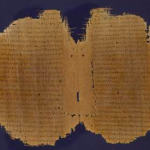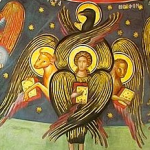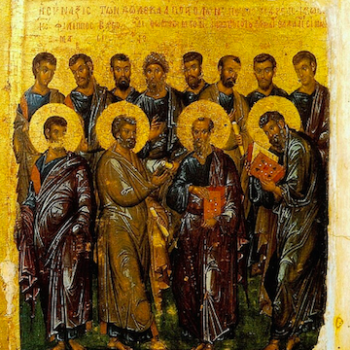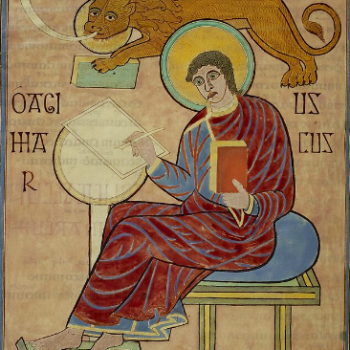The Pretext
I’m once again offering a translation of the epistle instead of the gospel reading, mainly so that I can take this opportunity to complain.
A few things bug me about the way liturgical readings are handled in the Roman Rite. Most of them boil down to our normal translation (which I’ve discussed elsewhere). Some of them, it bears saying, are truly silly: for instance, I hate that our lectionary inserts the phrase “brothers and sisters” at the beginning of almost every epistle reading, even though it’s a stock phrase that roughly signals the historical and in-document context. Historically, only the Apostles have reason to address others as “brothers and sisters,” and only after Pentecost: the authors of the Hebrew Bible mostly address themselves to “Israel,” and Jesus “to his disciples” (with important exceptions). Furthermore, none of the New Testament letters actually begins with this phrase, so it signals that we are picking up somewhere within the letter in question. The addition bugs me purely for the technicality’s sake, purely on the basis that the original text did not have ὦ ἀδελφοί in these places. To adapt a statement from Natalie Wynn of YouTube’s Contrapoints channel: I think, on some level, my feelings are “correct,” but this situation is so inconsequential, any amount of emotional energy spent on it is too much.

That said, there are cases where I think my irritation is less unreasonable. Our readings could stand to be more varied, for one thing, in both the Mass and the Office.* There are several books in the Bible that even a regular Sunday Mass-goer will never hear proclaimed during the liturgy—not just relatively minor writings like Judith, Obadiah, or III John, but more important books like Ruth, Esther, I Maccabees, even the Song of Solomon.
And of the books we do read from, it bothers me that the chosen texts seem so omission-happy. The Gospels and Ephesians are the only books of which we hear more than half,* and even the parts that do see liturgical use often skip segments. It’s not uncommon for readings to have verses and half-verses picked here and there from the flow of a passage, until the reference looks like an unattended chocolate chip muffin that a child has lit upon to relieve of its chocolate chips. (And when hee hath the kernell eate, / Who doth not fling away the shell?)
The idea makes sense in principle; some pericopes** are on the long side, and would make a liturgy unduly long in turn. This holds in some specific cases. Genealogies, for instance, play little role in our culture—certainly not the kind they played in the ancient Near East—and so leaving most of those out and spending our time on other texts is logical. What’s weird is that the lectionary’s omissions often serve no clear purpose. Our epistle for Epiphany is a textbook example; in the title, I have listed as the reading as Ephesians 3.2-6, but that’s not strictly true: it is Ephesians 3.2-3a and 5-6. Is a verse and a half really an amount of time worth saving? Why not have a longer selection? In this particular example, very little of significance is lost, but still, a tiny bit is; besides which, it makes things slightly confusing for those who do crack open their Bibles at home, only to find the text doesn’t seem to match what they remember from Mass. Why not just keep it intact? We can handle Ephesians 3.3b-4, USCCB. I promise.

Happy Epiphany, by the way! (Adoraçao dos Magos, post-12th century)
Ephesians 3.2-6, RSV-CE
Both for illustrative purposes, and because it was actually less irritating than working out where to place the division of v. 3a from v. 3b in my version, I’ve included the text that is not used in the liturgy (presented in grey type).
Surely you have heard about the administration1 of God’s grace that was given to me for you, that is, the mystery made known to me by revelation, as I have already written briefly. In reading this, then, you will be able to understand my insight into the mystery of Christ, which was not made known to people in other generations as it has now been revealed by the Spirit to God’s holy apostles2 and prophets. This mystery is that through the gospel the Gentiles are heirs together with Israel,3 members together of one body, and sharers together in the promise in Christ Jesus.
Ephesians 3.2-6, my translation
Surely, you have heard of the management1 of the grace of God given to me over you, because by revelation the mystery has been made known to me—just as I have hitherto written in brief, so that you might recognize and conceive my grasp of this mystery of Christ, which in other generations was not made known to the sons of men, as it has now been revealed in the Spirit to his holy emissaries2 and prophets. It is that the nations3 are co-heirs and co-embodied and co-citizens of his promise in Christ, on account of the good news.
Textual Notes
Note 1: administration/management. The Greek here is oikonomia [οἰκονομία], literally “house-law.” This had the meaning not of “house rules” in the Monopoly! sense, but of how to run a household or estate. This was the base “unit of production” in the ancient world (as opposed to the individual, the base unit in our own day), which is why this word is the ultimate ancestor of our word economy. In wealthier households especially, the management of production might be placed under the direction of a trusted slave.
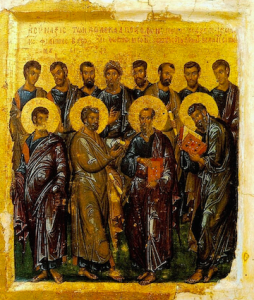
Note 2: apostles/emissaries. Apostle is the conventional rendering, but its meaning is purely religious: that is, it is now, and I’m not clear that it was ever used in a non-religious sense in either Latin or English. In Greek, however, apostolos [ἀπόστολος] was a normal word for an official representative; envoy, ambassador, messenger, and legate would all be serviceable translations, depending on the context. I chose emissary on the grounds that it implies formal representation without specifying a context, in contrast to e.g. ambassador, a specifically international and diplomatic role.
Note 3 the Gentiles … together with Israel/the nations. The phrase “with Israel” is, in this case, an insertion on the part of the RSV; its repeated phrases containing “together” are actually phrasal renderings of one-word adjectives in the Greek, all beginning with the element sün [σύν], “with” (which is actually related to our prefix co-: it is derived from cum, the Latin cognate of sün).
The term “the nations,” while a more literal rendering of the Greek, was and is a stock expression in Judaic literature, indicating all ethnicities other than the Jewish people, exactly as goyyim [גויים] does; in Latin, “the nations” would be the gentes or, with a substantive adjective, the gentiles. Early Christians adopted and adapted the usage, assigning the status of goyyim to non-Christians rather than non-Israelites. This meaning remained current for an extremely long time—St. Thomas’s Summa Contra Gentiles, an apologetic text aimed against atheism, paganism, and the other two Abrahamic faiths, was written in the thirteenth century, and the novel Silence, set in the seventeenth century and based in part on documents from that period, alludes to the Japanese crypto-Catholic community describing the rest of the Japanese as “the Gentiles.” Indeed, while I can guess at reasons why, I cannot offer a certain explanation of why Western Christians no longer use the word Gentiles in this sense.
*I say these things in reference to the Sunday lectionary, which sets the readings for Sundays and solemnities. (I got my data from this handy little site, and so it may be slightly out of date; I don’t recall hearing of any substantial changes to the lectionary since the turn of the century, but I might be mistaken.) The weekday lectionary is a good deal more balanced: the only books wholly omitted from its two-year cycle are I Chronicles, Judith, and Obadiah, while on the other hand we get the entirety of I John and miss less than a tenth of Mark, John, and James, as well as Ephesians. However, compared with Sundays and holy days of obligation, weekday Masses are poorly attended in most places. I put this down less to the impious indifference of Kids Today than to the reality that, for most people, the practical time to do anything other than school or work is during the only part of the day not claimed by those things, i.e. the evening; and yet most weekly liturgies continue to be scheduled in the dawn-to-noon range. After all, when else would we do things, living as we do in nineteenth-century Belgium. (Okay, that isn’t fair; I have seen encouraging signs of change on this point here and there, e.g. that evening Masses for holy days seem to be getting a little more common.)
**Pericope is a common term in biblical studies, indicating a natural unit of thought, narration, or argument. A good example is the “adulteress pericope” of John 7.53-8.11. This is more or less universally agreed not to be part of the original text of John (one theory being that it was accidentally inserted there from its right place in Luke); even though it cuts across our conventional divisions into chapters and verses, as we can see just from the reference, its textual or conceptual unity is easy to contrast with the first fifty-two verses of John 7, and with the remaining forty-eight verses of John 8, which are about quite unrelated events and topics.


